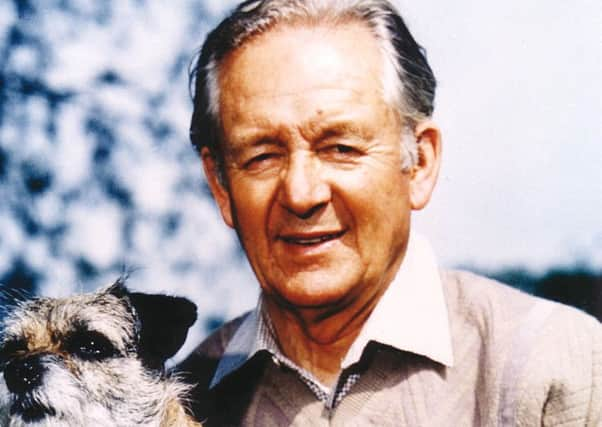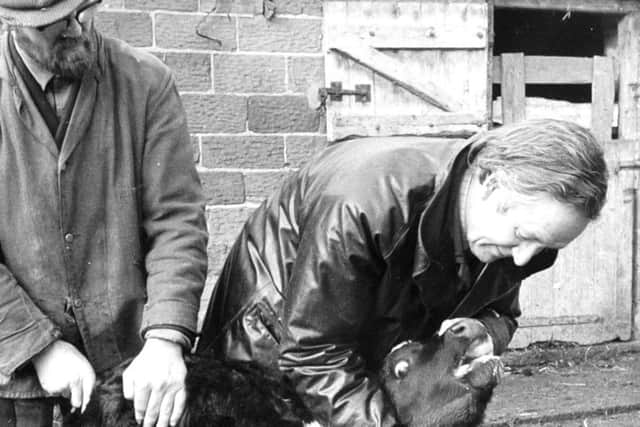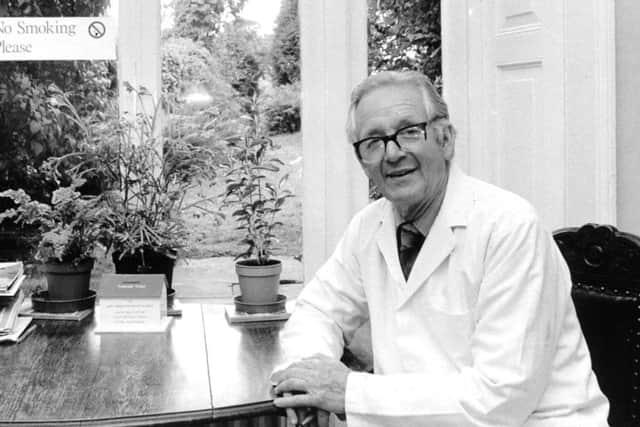James Herriot: Centenary of the much-loved vet who left his literary mark


If the name ‘Alf Wight’ is not instantly familiar then his pseudonym most definitely is.
As James Herriot he became a publishing phenomenon – his vet stories sold 60 million copies worldwide and stayed at the top of the New York Times best-seller lists for months on end.
Advertisement
Hide AdAdvertisement
Hide AdBut despite the fame and adulation that came his way this quiet, some say shy, man continued running his veterinary practice in Thirsk. “If a farmer calls me with a sick animal, he couldn’t care less if I were George Bernard Shaw,” he once said.


Monday marks the centenary of his birth and tomorrow members of Wight’s family along with friends and colleagues will attend a special black tie dinner in Leyburn to celebrate his life and work.
They will be joined by the main cast members of the BBC’s much-loved TV series inspired by his books, All Creatures Great and Small, including Christopher Timothy (who played James Herriot), Robert Hardy (Siegfried Farnon), Peter Davidson (Tristan Farnon) and Carol Drinkwater (Helen Herriot).
It is 21 years since Alf Wight died but his popularity remains undiminished. In Thirsk, the bustling North Yorkshire market town on the edge of the North Yorks Moors where he lived and worked for most of his life, he is still revered.
Advertisement
Hide AdAdvertisement
Hide AdThe World of James Herriot, the museum now housed in Wight’s original home and surgery, is enjoying a resurgence and last year a statue was unveiled of the world’s most famous veterinarian in the museum’s garden.


Not only that but tourists from as far away as Australia, New Zealand and Japan still make a beeline for “Herriot country” when they visit the UK.
Peter Wright worked with Alf Wight and Donald Sinclair, who inspired the Siegfried Farnon character in Herriot’s books, after joining their practice (now the Skeldale Veterinary Centre) in 1982. “Alf was a very shy man, he wasn’t interested in being a celebrity or anything like that. He enjoyed his work and if I ever had a problem I could ask his advice, he was always willing to help.”
Though he was a quiet man he possessed a flair for storytelling. “He was a great raconteur and he loved telling stories, usually ones that revolved around farmers.”
Advertisement
Hide AdAdvertisement
Hide AdPeter says the practice was based around an ethos of warmth, friendliness and approachability where all animals were treated equally. “It didn’t matter if it was someone’s prized racehorse or a little wild bird they all got the same attention – it really was all creatures great and small.”


He remembers that after Alf’s literary career took off he began working part-time in the practice. “On Wednesdays and Fridays there would be a real throng about the place. People came from all over the world just to see him. You’d be running a surgery and look out the window and see a queue of people down the street clutching books rather than pets.
“On some days there were five or six people who wanted to see the vet and 150 people waiting to have their books signed. Alf insisted that people waited until all the patients had been seen first, but he gave everyone his time. His view was they had travelled to Thirsk to see him so it was the least he could do.”
Peter says he learned a lot from his former mentor. “When someone with his kind of experience offers advice then you start listening.”
Advertisement
Hide AdAdvertisement
Hide AdBut he’s not alone in benefiting from Alf’s expertise. “He did an awful lot for Thirsk in terms of tourism and the economy and people here still hold him in awe.”


Among those attending tomorrow’s gala dinner will be Alf’s son, Jim Wight, who says his father had a profound influence on him. “He moulded my life. I followed him into veterinary practice here in Thirsk and ended up writing a biography of him so in a small way I followed him as a writer, too.
“He was such a good father who always made time for us. He was very much a family man. People often ask what’s it like being the son of someone famous but he was never James Herriot to us, he was Alf Wight the vet.”
This, Jim says, is how he viewed himself. “He never thought of himself as James Herriot. He wanted to be remembered as 90 per cent vet and 10 per cent author.”
Advertisement
Hide AdAdvertisement
Hide AdHe remembers watching his father working on his books when he was younger. “He started writing in the late 1950s when he was working hard as a vet. He was writing in his spare time. I used to watch him writing them, sat in front of the television.”
The James Herriot books became hugely popular not only in Britain but around the world, particularly the United States, with a steady stream of tourists beating a path to Thirsk and Alf’s veterinary door.
“He was so big in America,” says Jim. “We’d get tourists coming to the practice just to meet him which was a bit of a nuisance to be honest. Some of them would burst into tears when they met him and I used to watch all this gobsmacked.”
Not that fame ever went to his father’s head. “He used to say ‘nobody bothers me here’ and he liked that, he didn’t want to be in the limelight.
Advertisement
Hide AdAdvertisement
Hide Ad“I remember a farmer came to see him and said, ‘I’ve read one of your books.’ And my father said, ‘what did you think of it?’ And he said, ‘it’s all about nowt.’ In America they saw him as a god and in Thirsk he was just one of the lads.”
Jim says his father wasn’t interested in the trappings of fame and celebrity. “He dealt with it well, it never got on top of him. He never changed, he had the same friends and went to the same pub. He didn’t drive a big car and he lived in a bungalow. It was a nice bungalow, but it was still just a bungalow.”
He could very easily have quit his practice and gone to live abroad, but he preferred to stay in Yorkshire. “He could have gone abroad and made a lot more money. Some people thought he was nuts, but he always said he’d got enough money and didn’t need any more. He wasn’t greedy and he didn’t want to live in a tax haven, he wanted to live in Yorkshire.”
A couple of years before his death in 1995 Alf was made an honorary Yorkshireman, something he was hugely proud of. “It meant a lot to him because he loved the county,” says Jim.
Advertisement
Hide AdAdvertisement
Hide AdToday, his books continue to enthrall, attracting a new generation of readers. “Lots of vets have written books and quite often they are well written but they normally describe the life of a vet.
“James Herriot went further than that, the veterinary profession was a backcloth for him to explore human emotions. He had these wonderful characters and he painted such vivid pictures of them.”
But it’s not just the characters that draw people in. “He wasn’t just writing about treating animals, it was about the people and a whole way of life in Yorkshire. This world has almost gone now and his books are a kind of history and that’s why they will keep on selling,” he says.
Although James Herriot became a publishing sensation this didn’t just happen overnight. “It took six or seven years to write the first little book and each time he got rejected he would go back and re-write it and each time it got better.”
Advertisement
Hide AdAdvertisement
Hide AdJim says the original manuscript his father wrote is completely different from his first book, If Only They Could Talk, that was finally published in 1970.
“If he’d been accepted straight away I don’t think he would have been as successful as he was,” he says. “It goes to show that practice makes perfect.”
The world of James Herriot
Alf Wight was born in Sunderland on October 3, 1916, the son of an orchestra leader.
He grew up in Glasgow and trained at Glasgow Veterinary College, arriving in Thirsk in 1940 for a now-famous job interview with Donald Sinclair – who inspired the character of Siegfried Farnon.
Advertisement
Hide AdAdvertisement
Hide AdHis first book, If Only They Could Talk, was published in 1970. He went on to write a string of stories based on his experiences as a young vet working in Yorkshire.
The James Herriot books spawned two feature films followed by a television series, All Creatures Great and Small, which enjoyed global success.
Alf Wight died at his home in Thirlby in 1995 at the age of 78.